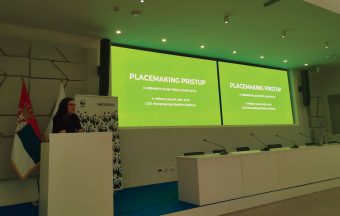Atypical cancers, endocrine disorders, neurological impairments, allergies, and vector-borne diseases are a common denominator, whether we are talking about climate change or excessive plastic pollution as their cause. The ability of the system to function is repeatedly proven when a crisis occurs, yet what is missing is mitigation and adaptation to climate change, along with a systematic approach to prevention and treatment once the crisis has passed. These were the key conclusions of the second WWF Environmental Policy Forum, Impact on People and Health.
„There is ample evidence that climate disruptions have led to an increase in diseases that were previously considered atypical for our region. A concrete example is West Nile fever or allergies, which nearly 50 percent of the population now reports experiencing symptoms of. We feel these effects every day. The range of causes extends from heat waves (which are responsible for the immediate deaths of 70,000 people), through droughts and floods, to the emergence of viruses we are encountering for the first time”, stated Dunja Macoko Drvar, Director of the Nature Conservation Program at WWF Adria.

Milanko Šekler, scientific advisor at the Veterinary Specialist Institute in Kraljevo, explained that viruses primarily spread through insects and birds, their most frequent targets. He emphasized that any climate deviation of even +0.1 degrees Celsius results in an expansion of insect populations by approximately 150 kilometers north and south of the measurement point. Maja Vučković Krčmar from the Delegation of the European Union followed up with data from the World Health Organization (WHO), highlighting the alarming increase in lung cancer cases among non-smokers (with as many as 200,000 cases recorded), as well as a 15 percent rise in cardiovascular diseases in 2023.
„Through our actions or inaction, humans will push themselves to the brink of survival, while nature will endure”, emphasized Vučković Krčmar.
IN FOCUS:
- Challenges and Opportunities for Montenegro on the Path to a Circular Economy
- First DC Chargers in Cities Across Serbia
- Naled Advocates For More Efficient Municipal Waste Management in 2025
To Sustain Healthcare Systems, Investments, and Workforce Retention Are Crucial
To ensure the survival of healthcare systems, we must invest more in healthcare, work on motivating healthcare professionals to remain in the country and follow the recommendations of recognized experts. According to Igor Jezdimirović from the Association of Environmental Protection Engineers, of the 1.25 kg of waste we produce daily, 0.2 kg is plastic, which ends up in sanitary or non-sanitary landfills. The lack of deposit and recycling systems, as well as the unwillingness to enforce existing regulations, has led to a general reluctance to address the issue of waste management.
Once plastic breaks down into micro and nanoparticles, it primarily ends up in the water, from where it enters the bodies of humans, plants, and animals. Senior Research Associate Maja Raković noted that the Institute for Biological Research Siniša Stanković maintains a relational database on river pollution in the Danube basin, which is updated daily with precise data. This database could serve as a foundation for further research on the impact of microplastics on aquatic ecosystems and human health. Large quantities of plastic are present in 63 percent of everyday products, with its proportion ranging from 15 percent to 50 percent.
„The most common way humans are exposed to harmful plastic substances is through skin contact (via clothing, cosmetics, and hygiene products containing these particles). Long-term exposure, even at low intensity, is key to understanding how these substances accumulate in the human body”, warned Branislava Matić from the Institute of Public Health of Serbia Dr Milan Jovanović Batut.

Another major water-related issue caused by climate change is water blooming, which leads to the proliferation of cyanobacteria. Without first acknowledging that nearly all surface waters are affected by this issue, followed by proper and continuous monitoring and ultimately timely interventions by public water treatment companies, disruptions in water supply systems become inevitable. The most recent incident occurred in Užice, but this case also demonstrated how a crisis led to the redefinition of operational processes to prevent similar situations in the future. Marija Simić Savić from the association Ekomar emphasized that it is crucial to encourage all authorities responsible for water management to conduct regular and proper monitoring to ensure an uninterrupted water supply and prevent potential crises.
„Environmental issues are the greatest generational battle. I urge all actors, both institutional and non-institutional, not to lose enthusiasm and to continue upholding the principles of networking, to which forums like this significantly contribute”, stated Mihailo Vesović, Director of the Sector for Strategic Analysis, Services, and Internationalization at the Chamber of Commerce and Industry of Serbia, during the opening of the Forum.
The WWF Environmental Policy Forum was organized at the Chamber of Commerce and Industry of Serbia and implemented as part of the Safe Nature and Climate project, which was financially supported by the European Commission. The project’s goal is to strengthen the capacity of civil society organizations in Serbia that focus on environmental protection and climate change.
WWF
The story was published in the Energy portal Magazine CIRCULAR ECONOMY



